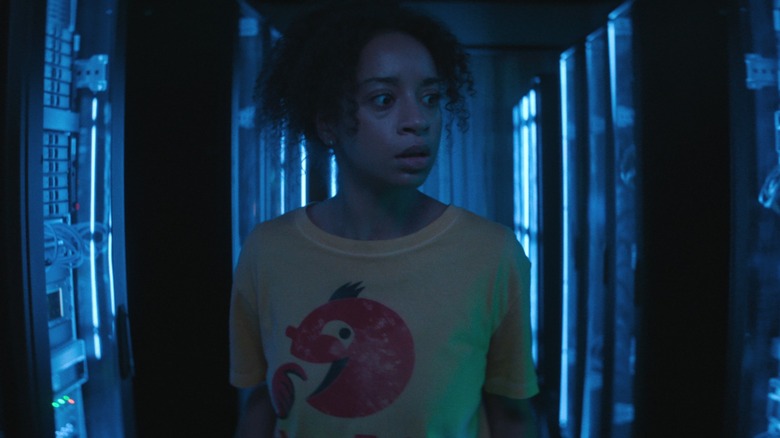Included in this post Spoilers About Season 7 of “Black Mirror.”
When Charlie Brooker’s “Black Mirror” plunged into the scene in 2011, it had a finger in every pulsation of speculative fiction. Think of the most thought-provoking dystopian story bytes attached to the Anthology format and explore everything from data privacy and consumer identity to the virtual realm of consciousness within a science fiction setting. Even the most central episodes were supported by valuable visions, as every story emphasized essential truths. However, the decline in quality was revealed when Time Season 6 rolled. Season 7 appears to follow in the footsteps of its predecessors, offering a mixed bag of disappointing stories that don’t create a lasting impression. It’s as if the “Black Mirror” has lost its advantage.
advertisement
That being said, the latest season features several episodes that explore solid premises. Toby Haynes’ “Bête Noire” is one of them, taking an interesting (predictable) approach to the changing concept of reality. The episode opens with the sweet With Maria (Siena Kelly), who enjoys the latest batch of flavored o-jam chocolate (!) along with her boyfriend Kae (Michael Worke). Maria seems to understand her life. She is a development executive at a chocolate company and is deeply grateful for her ready-to-use artistry. A familiar face pops up during a taste test of her batch of her batches of tasting o jam treats in the office. Verity (Rosy McEwen), who attends the same school as Maria, appears on the test and self-improves the group’s opinion on a batch of sweets that was initially not received much.
advertisement
Does “Bete Noir” set up an emotional reunion, or will he frame Verity’s arrival as evil? Given the harsh storytelling preferences of the anthology series, this episode produces towards the latter, creating situations that evoke tension-like delusions for both Marie and the audience. The very nature of reality is questioned, and is blurred by Marie’s credibility as the protagonist and the confusion of facts and fiction. When you think the episode did a decent job of hiring the ace of the story, it gives a lame, lazy ending that ruins everything it worked so hard to. Let’s talk about that.
The end of Bête Noire strips its scattered episodes of merit
Maria establishes a determined, personal belief from the beginning. She was a high school unpopular nerd who spent most of her time in computer classes, so there’s something “off” about Verity. Of course, this valuation cannot be taken at face value. Because Maria’s conversation about true nature makes her very clear about her own anxiety and the tendencies of the average girl. If anything, Verity was bullied by popular people like Maria at school, and was forced to be on the sidelines while being teased. This aspect of Maria’s character appears to be rather transparent when she reacts negatively because she is employed as a research assistant in her company.
advertisement
While Maria’s flaws are rooted in truth (we are forced to reevaluate her claims about the truth), this episode gradually reveals the behind-the-scenes of reality. As the week progresses, Maria’s life gets worse, with little details about her life changing in the blink of her eyes. Chicken Shop (who Maria has been known for years) magically changes its name (a destructive use of the Mandela effect) and the seaweed-based ingredients mentioned in the email to non-pork. For obvious reasons, she condemns Verity, who appears to be suffering due to Maria’s increasingly paranoid behavior. As the climax unfolds, we learn what we’ve been guessing for a long time. Verity is malicious like Heck, and after learning how to change reality on a whim, he is here for revenge.
advertisement
Predictability may be the name of the game “Bête Noire,” but it’s approaching exploring interesting questions about casual abuse and its lifelong outcomes. People like Maria may intentionally erase the ambitious aspects of the past as they grow up, but those affected by her cruelty always remember. Verity weaponizes her intelligence against bullies and uses it to become the person she wants, including someone worthy of worship. However, these grounded themes are finally caught bystanding, with Maria shooting at the truestness and using reality-control signals to become the “Empress of the Universe.” This ridiculous concept is interpreted with tinsel CGI, thousands of knee-jerk worshippers, and the deaf spin of the story. largely It was worth considering.
This ending gives us nothing. It is the shallow police officer who avoids Maria’s accountability. Rather than facing consequences or growing as an individual, Maria is on a huge trip with endless possibilities. Verity’s heart-warming invention is quickly shiny MacGuffin, so there is no riveted sci-fi ratio es adopted here as well. Essentially, “Bete Noir” feels rather empty, and its momentum derails at the moment Maria presses the button of destiny with one of Verity’s pendant remotes.
advertisement






